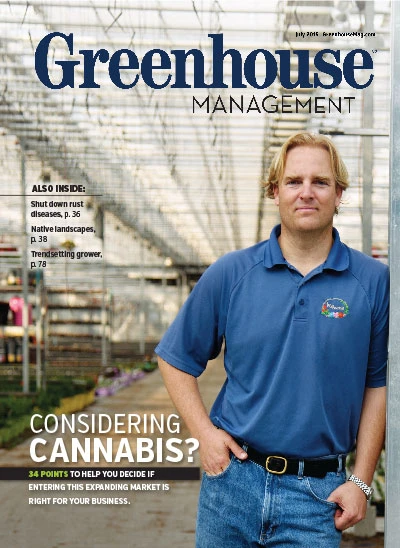
Edenworks is a first-year growing operation based in bustling New York City. Headquartered in Brooklyn and founded by a trio of innovative urbanites, the farm has grown significantly since its founding in 2013. With an eye on closing the production loop, the company is attempting to grow fresh produce (greens and root crops) using a hybridized aquaponic-hydroponic system. As their operation enters a planned expansion period, the company has discovered one of the most common challenges in horticulture: Hiring good talent.
Hiring is consistently listed as one of the three most arduous challenges facing greenhouse operations. Finding qualified growers is difficult. The pool of graduates is thin and experienced technicians are always in hot demand. When talented growers surface, competition for their services can be intense. According to the Greenhouse Management 2014 State of the Industry Report, 53 percent of growers said finding and hiring good talent was difficult (see accompanying chart).
Edenworks co-founders Jason Green, CEO, and Ben Silverman, Chief Design Officer, recently discussed their hiring process and the challenges in finding qualified job candidates.

Greenhouse Management: Can you describe your process for filling a job vacancy?
 Jason Green: We build a job description and try to figure out what the minimum skill level candidate and the ideal candidate skill levels are. We then work through LinkedIn to discover talent. Or, if we have someone on the team with a similar skillset, we’ll go through their networks.
Jason Green: We build a job description and try to figure out what the minimum skill level candidate and the ideal candidate skill levels are. We then work through LinkedIn to discover talent. Or, if we have someone on the team with a similar skillset, we’ll go through their networks.
We put a spreadsheet together, a hit list of candidates so to speak. And then we go through a screening process. We have a standard set of questions. Occasionally we’ll send those questions in advance or we’ll ask the screening questions on a phone call.
Then we’ll do a scoring interview. We’ll ask very specific questions to all of the candidates applying for a single job and then, once we have enough applications, we’ll then score all of the candidates next to each other. We usually receive two to 10 applications for a job.
Then we’ll figure out who we want to consider pursuing and make an offer.
Ben Silverman: But it’s not easy to find candidates. We’re looking for someone to fill a position now who has a lot of experience as a greenhouse operator; someone who has gone through the process of germination to growing beautiful produce to putting it in a box and getting it ready to ship. It’s been surprisingly difficult to find candidates.
JG: We’re spending a lot of time digging through LinkedIn trying to find qualified candidates. That’s somewhat stressful because we’re designing our next farm and we want to make sure we’re making the right decisions. But, also, we’re looking for somebody who can really help push the design.

GM: What websites do you use to find candidates?
JG: We mostly use LinkedIn primarily because the really talented people, by and large, already have a job. If you want really good talent, somebody else probably already has him or her and you’re going to need to poach. We have more inbound hires than outbound hires. Inbound hires being people who have found us and said, “I know you’re looking for X position but here’s my skillset, and here’s all the ways I think I can help.” That’s been really cool and it was a good way to build our initial team.
Now that we’re looking to fill specific roles we’re using resources like LinkedIn to find people that might work for similar companies. It’s unlikely that we’ll find a candidate by posting a job and attracting someone that is looking already.
GM: Do you think hiring is more difficult for your operation because you’re effectively a startup?
JG: There is some perceived risk. But the company has funding through the end of the year, which in startup terms is actually pretty awesome. For the average candidate, specifically for the positions we’re trying to fill, we’re asking people to potentially relocate to New York City. These are people living in Thailand, Saudi Arabia, Hawaii and they’re reluctant to leave their lives for funding through the end of the year.
BS: And we’re looking for someone with experience, so that is probably someone a little bit older who probably has kids. And that’s another challenge and it increases the risk.
For more information on Edenworks, visit the website www.edenworks.org or read “Closing the Loop” in the February 2015 edition of Produce Grower.
Correction
On page 28 of the June 2015 issue, we mislabeled this variety by Floranova. It should have been identified as Blackberry Swirl experimental viola. We apologize for any confusion.

Explore the July 2015 Issue
Check out more from this issue and find your next story to read.
Latest from Greenhouse Management
- 2025 Proven Winners Horticulture Scholarship applications now open
- How to improve inventory and shipping management in the greenhouse
- Leading Women of Horticulture: Anna Ball, Ball Hort, and Terri McEnaney, Bailey Nurseries
- GM CEA HERB Part 2: A guide to increasing the sowing density of culinary herbs
- GM CEA HERB Part 1: Best practices for producing culinary herbs in controlled environments
- USDA fires experts on invasive pests, including Asian citrus psyllid, chilli thrips
- CEA Alliance celebrates bipartisan introduction of Supporting Innovation in Agriculture Act
- Dümmen Orange North America celebrating 25th anniversary in 2025








